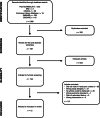Weight-Related Outcomes After Revisional Bariatric Surgery in Patients with Non-response After Sleeve Gastrectomy-a Systematic Review
- PMID: 37209388
- PMCID: PMC10289909
- DOI: 10.1007/s11695-023-06630-2
Weight-Related Outcomes After Revisional Bariatric Surgery in Patients with Non-response After Sleeve Gastrectomy-a Systematic Review
Abstract
Weight non-response after sleeve gastrectomy is an emerging issue. This systematic review compared revisional procedures for weight-related outcomes. We searched several databases for relevant articles and included adult patients with revisional bariatric procedures after primary sleeve gastrectomy. Twelve trials with 1046 patients were included, covering five revisional procedures. There were no randomised controlled trials, and 10 studies had a critical risk of bias. Significant variations in inclusion criteria, therapy benchmarks, follow-up schemes, and outcome measurements were observed, preventing meaningful comparison of results. Evidence-based treatment strategies for weight non-response after sleeve gastrectomy cannot be deduced from the current literature. Prospective studies with well-defined indications, standardised techniques, and strict adherence to outcome measurements are needed.
Keywords: Conversion; Revisional bariatric surgery; Sleeve gastrectomy.
© 2023. The Author(s).
Conflict of interest statement
The authors declare no competing interests.
Figures




Similar articles
-
Revisional surgery after failed laparoscopic adjustable gastric banding: a systematic review.Surg Endosc. 2013 Mar;27(3):740-5. doi: 10.1007/s00464-012-2510-2. Epub 2012 Aug 31. Surg Endosc. 2013. PMID: 22936440
-
One-anastomosis gastric bypass (OAGB) versus Roux-en-Y gastric bypass (RYGB) as revisional procedures after failed laparoscopic sleeve gastrectomy (LSG): systematic review and meta-analysis of comparative studies.Langenbecks Arch Surg. 2023 Nov 18;408(1):440. doi: 10.1007/s00423-023-03175-x. Langenbecks Arch Surg. 2023. PMID: 37980292 Free PMC article.
-
Revisional Roux-en-Y Gastric Bypass and Sleeve Gastrectomy: a Systematic Review of Comparative Outcomes with Respective Primary Procedures.Obes Surg. 2015 Jul;25(7):1271-80. doi: 10.1007/s11695-015-1670-2. Obes Surg. 2015. PMID: 25893649
-
Sex difference in the safety and efficacy of bariatric procedures: a systematic review and meta-analysis.Surg Obes Relat Dis. 2022 Jul;18(7):983-996. doi: 10.1016/j.soard.2022.03.022. Epub 2022 Apr 20. Surg Obes Relat Dis. 2022. PMID: 35668018
-
Outcomes of revisional surgery options after inadequate sleeve gastrectomy: A comprehensive network meta-analysis.World J Surg. 2024 Sep;48(9):2040-2057. doi: 10.1002/wjs.12293. Epub 2024 Jul 28. World J Surg. 2024. PMID: 39072840
Cited by
-
Medium and Long-Term Weight Loss After Revisional Bariatric Surgery: A Systematic Review and Meta-Analysis.Obes Surg. 2024 May;34(5):1917-1928. doi: 10.1007/s11695-024-07206-4. Epub 2024 Apr 4. Obes Surg. 2024. PMID: 38573390
-
Roux-en-Y Gastric Bypass after Laparoscopic Sleeve Gastrectomy Failure: Could the Number of Previous Operations Influence the Outcome?J Clin Med. 2024 Jan 4;13(1):293. doi: 10.3390/jcm13010293. J Clin Med. 2024. PMID: 38202300 Free PMC article.
References
-
- Pollack A. A.M.A. recognizes obesity as a disease. The New York Times; 2013.
Publication types
MeSH terms
LinkOut - more resources
Full Text Sources
Medical

